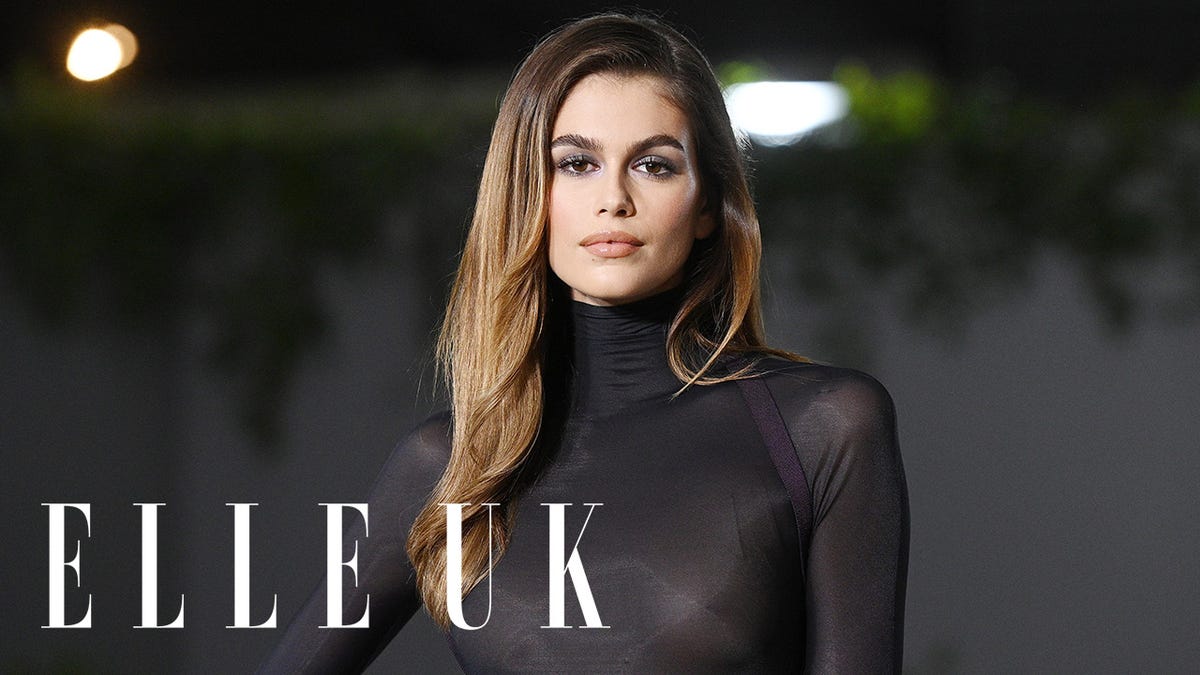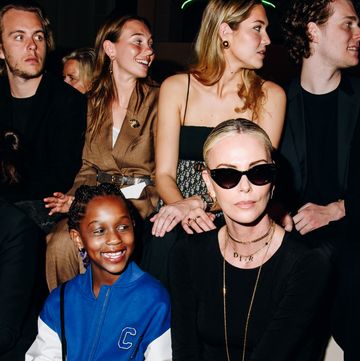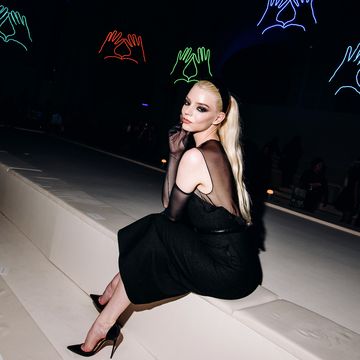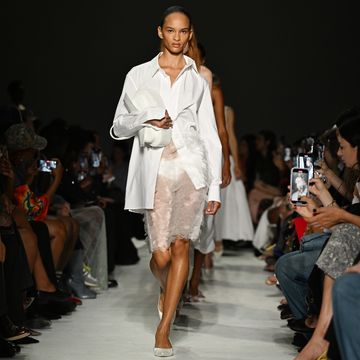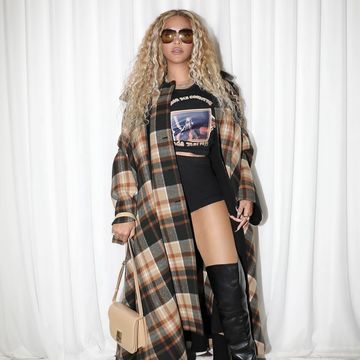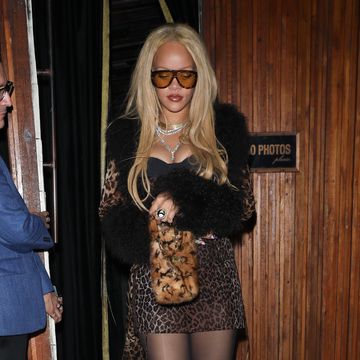To recap briefly on the (recent) history of the celebrity Naked Selfie: Last year, Kim Kardashian uploaded a photo of herself completely nude (but censored) to her 63.8 million followers. A social media shitstorm ensued, with everyone from Bette Midler to Miley Cyrus weighing in. In response to the backlash, Kardashian later published a post on her blog defending the photo and saying, in part "enough is enough [with] the body-shaming and slut-shaming."
Kardashian is by no means the only person taking and posting naked selfies. Miley Cyrus, Lady Gaga, Rihanna, and Emily Ratajkowski (to name a few) have all posted essentially nude photos on Instagram at one time or another. A 2014 study showed that the majority of young people (54 percent) have sent or received explicit content on their phones, with girls being far more likely to send photos.
As social media becomes more integral in the lives of young people, it's no surprise that this behavior has migrated onto feeds: On Instagram, the hashtag #nude brings up 2.4 million posts.
Kardashian's naked selfie, then, isn't an anomaly; it's part of a cultural phenomenon in which we're all players. The question is, is this trend a signifier of female liberation and empowerment—as Kardashian and her supporters claim—or is it just another example of the pernicious pressure women feel to display their sexuality and bodies?
The answer, it turns out, is a bit of both.
For Danielle Galvin, a 23-year-old body-positive activist from Cairns, Australia, the act of posting a revealing selfie is indeed one of defiance and empowerment. "As a plus-size woman I am consistently told by society to cover up because my body is not found attractive or sexually exciting to men," she said. "For me, it's a mix of fat activism as well as reclaiming my body from sexual assaults and making more body types normalized."
She also noted that the mainstream media, particularly magazines, constantly bombards us with images of scantily clad women—yet these images rarely, if ever, get criticized for being exploitative, slutty, or demeaning.
"Every November/December the Victoria's Secret show is one of the most-watched televised events, and while all the girls on that show are beautiful and should be respected, me in lingerie on my Instagram is slammed," she said.
Galvin is right: There is a double standard.
The same week that Kim Kardashian tweeted that infamous selfie, Galvin shared a photo of herself holding up copy of a Harper's Bazaar Australia's January/February issue. Miranda Kerr, back arched and naked save for a pair of stilettos, is on the cover, with the line "Miranda Kerr Lies Beneath."
"So my risqué photos on Instagram lately have been labelled trashy, attention seeking, disgusting, classless and here on Australia's January 2016 Harper's Bazaar is Miranda Kerr butt-naked," she wrote. While Galvin continued to say that she commends and respects Kerr, she asked [sic]: "Is nudity and confidence in your body only okay if you are a model who has professional team behind her. Is it only okay on a Harper's Bazaar cover...While girls like me who are claiming their bodies on Instagram taking a photo with my iPhone it is deemed not as worthy, or classy, or meaningful?"
When I talked to Galvin, she agreed that part of the reason Kim Kardashian's selfie prompted such vitriol is because the reality TV star is viewed as a "certain kind of girl." Kardashian herself hinted at this in her blog post: "It always seems to come back around to my sex tape," she wrote. In a landmark study published in 2014 in the Journal of Children and Media, a prevailing attitude emerged that only "a certain 'type' of girl sends sexts." That type was described—by the studies' male participants—as "crazy, insecure, attention-seeking sluts with poor judgment." However, girls were also judged as "stuck up" or "prude" if they outright refused. (The study, by the way, is aptly titled Damned if You Do, Damned if You Don't…if You're a Girl.)
And while it's tempting to think that the empowered choice, then, is to unashamedly post or share revealing selfies, the reality is a little more complicated than that. "Though I unwaveringly support Kim's choice, I also think we don't make choices in a vacuum and the social messages that influence how much value we place on women's bodies can play a role in any choice that we make about ourselves," noted Melissa A. Fabello, Managing Editor at Everyday Feminism.
Regardless, this catch-22—that women are constantly pressured to display their sexuality, and then immediately shamed and denigrated for doing so—is enormously damaging. This pattern has got to stop. However, Kim Kardashian sharing naked selfies is probably not going to accomplish that. Actually, it might be making things worse.
As media psychologist and director of the Media Psychology and Research Center Dr. Pamela Rutledge pointed out, Kardashian's personal feelings and motivations do not reflect those experienced by her followers, many of whom are young women.
"Kim Kardashian's nude photos are empowering for her, but exploitive of her audience," she said. "She is empowered all the way to the bank. She not only controls her image, she cultivates it. She is a brand. Cyberbullies are her best friends. The more rude things people say, the more people watch to see what will happen." Rutledge also notes that the timing of the whole kerfuffle—immediately following a swell of articles suggesting a Kylie Jenner usurping of the Kardashian social media throne—is suspect. I also think it's worth noting that Kardashian's thoughtful, well-written blog post was shared rather fortuitously on International Women's Day.
Media stunt or not, Rutledge says that her behavior, as a role model, is "problematic."
Rutledge wrote in an email:
Kim is modeling what's best for her career, not what's best for her fans. What most young girls don't appreciate is that while cyberbullies benefit Kim Kardashian, they don't benefit most people. Nude photos once posted on the Internet don't go away. This is good news for Kim Kardashian, but not for almost everyone else. Kim Kardashian has the luxury to cultivate this online turmoil; she travels with bodyguards, rides in limos and has a legal team, and PR handlers who can step in at any time. Most of her fans face the reality of friends or the student body at school without any backup at all and little psychological resources to cope with the fall out.
While Kardashian has a right to post whatever she wants for her personal pleasure or empowerment, it would be naive to think those are usually (if ever) her sole objectives. It bears repeating that this woman is followed on Instagram by 63.8 million people. She has a wider audience than most mainstream magazines and websites and she absolutely knows how to manipulate and entice them. At the end of the day, Kardashian is producing media for the consumption of others—and that's why her selfie is fair game for criticism and analysis.
Yet beyond the actual photo, it's the discussion surrounding it that might actually be more indicative of the way society feels about women. "This, like many other debates that pepper the Internet and beyond, is being made into a black-and-white issue when it's actually a nuanced one," said Fabello.
"People are arguing that either Kim Kardashian is sex-positive and body accepting or that she's perpetuating harmful narratives about women's bodies. In reality, it can be a little of both, and I think we need to make room for the possibility of a 'Yes, and' conversation. Yes, women are unfairly pressured to display their bodies, and women are allowed to make choices about those bodies."

